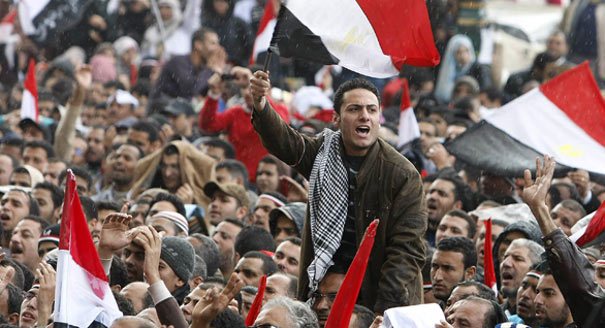Nathan J. Brown
{
"authors": [
"Nathan J. Brown"
],
"type": "legacyinthemedia",
"centerAffiliationAll": "dc",
"centers": [
"Carnegie Endowment for International Peace",
"Malcolm H. Kerr Carnegie Middle East Center"
],
"collections": [
"Arab Awakening"
],
"englishNewsletterAll": "menaTransitions",
"nonEnglishNewsletterAll": "",
"primaryCenter": "Carnegie Endowment for International Peace",
"programAffiliation": "MEP",
"programs": [
"Middle East"
],
"projects": [],
"regions": [
"North Africa",
"Egypt"
],
"topics": [
"Political Reform",
"Democracy"
]
}
Source: Getty
Egypt's Constitution Conundrum
It is important to view the new Egyptian constitution as a political document—a product of specific circumstances that will not merely shape a future set of circumstances but also function within them.
Source: Foreign Affairs

And that is the critical point so often missed: political context always shapes the meaning of constitutional texts. The Arab world's experience with apparently democratic constitutional provisions confirms the rule. Democracy has failed in the Arab world not because governments have routinely violated their countries' highest laws (although they have occasionally cheated) but, rather, because their constitutions' democratic promises have generally been as vague as possible and were left to parliaments to flesh out through regular statutes. European countries first developed that system to ensure that popularly elected bodies, not kings, would define basic rights. When Arab regimes copied the practice -- for example, many of them proclaimed freedom of the press but explained that the freedom would be "defined by law" -- the effect was that rulers could pledge all kinds of rights and let rubber-stamp parliaments rob them of all meaning.
It is thus important to view the new Egyptian constitution as a political document -- a product of specific circumstances that will not merely shape a future set of circumstances but also function within them.Egypt's political climate has changed in some very positive ways in the last few years, but only when taking the long view. For one, the party system, which until 2011 consisted of a domineering, corrupt, and creaky machine and a host of desiccated and forgotten paper organizations, has sprung back to life. All kinds of people and groups have entered the fray. And the media, which were growing lively even before the Arab Spring, have discovered the will to cross red lines. Political somnolence has given way to a deeply engaged society.
But politics are resurging in an environment devoid of rules and unity. In the media, wild charges and extreme rhetoric fly. Since the dissolution of the parliament in June, there has been no venue in which groups can hammer out their differences. Conciliators have faded from political life, and the institutions that should sit on the sidelines of politics, most notably the military and the judiciary, have not been able to resist joining the game, bloodying themselves in the process. Meanwhile, no actor has been able to deny the urge to defeat rivals by subverting the few rules that do exist.
And that is precisely where the constitution could have helped. In the short term, it could have begun the slow process of rebuilding trust through an inclusionary process that awarded everyone a seat at the table. In the long term, it could have established a basic and broadly accepted political framework. But the draft is failing dramatically in the first task and is severely handicapped in the second.
With regard to the short-term job, process can be more important than content. But a fatal flaw was inserted into the process in March 2011, when a small committee of legal figures hastily (and partly unwittingly) designed a system in which a narrow parliamentary majority could name whomever it liked in the assembly to draft the country's permanent constitution. At the time, it was not yet clear that there was any electoral majority in Egypt to speak of, so few commented on the potential problem. In fact, there was a majority, the Islamists, who found that they could pile up one electoral victory after another and thereby choose the constitution's authors. An attempt by the new parliament to negotiate a consensus drafting body fell through, leaving Islamists feeling as though they had pulled their punches and non-Islamists feeling as though they had been excluded and railroaded.
Allowing a majority to rule might be healthy in a well-functioning democracy, but not when a country is still trying to design a widely accepted system -- it creates many sore losers and shuts out voices that need to be heard at the beginning of the process. For their part, the Islamists have pressed ahead, willing to throw some concessions to their rivals but not enough to truly bring them along. Even had the Islamists been willing to give more, it is not clear that there was any good-faith bargain to be had, since some members of the opposition have simply rejected earlier electoral outcomes as "unrepresentative."
Already, the institutional wreckage and political damage is extensive and will be difficult to overcome. Egyptian President Mohamed Morsi's decision to take on absolute authority -- even on an interim basis -- and the rushed production of a final draft of the constitution have not only led to clashes in the streets but also to contests among Egyptian state bodies.
For one, the country's professional associations are badly split between supporters of the Islamist government and their opponents. Civil war in the labor unions might be brewing. The judiciary has risen in protest, and it is difficult to see how the institution, which had managed to maintain some autonomy even during Egypt's most authoritarian periods, could emerge unscathed. In turn, the country's electoral machinery might be badly damaged, because it depends on the oversight of the deeply offended judges.
Morsi professes to hear the ruckus but, thus far, it has only deepened his determination to push the process forward; he wants a stable set of rules to guide Egypt's return to normal political life. But could the constitution, if it passes, lay the groundwork for a fair and democratic political game in the long term? Once the people have spoken, the constitution could become a fait accompli -- and opposition leaders might not seek to overturn it, instead acquiescing and learning how to use whatever tools it gives them. Constitutions are rarely written in calm moments, and many outlive the contentious circumstances that brought them into being. After all, Egypt's most democratic system was governed by a constitution written in 1923 by a committee that the country's most popular political actor, the nationalist Wafd movement, had boycotted.
Today's bitterness, now accompanied by bloodshed, makes a similar outcome seem unlikely any time soon. Even if the deep wounds eventually heal, the constitutional text raises concerns. Whether it eventually becomes the basis for a pluralistic system or a tool for a standing Islamist majority depends on five key factors.
First, the laws that are developed to give the constitution's clauses concrete meanings are important. The document's more liberal provisions will require the rewriting of large areas of Egyptian law that are currently authoritarian, such as those governing the press and nongovernmental organizations. It is, as yet, unclear how fast and how enthusiastically the parliament will be able to meet this obligation. In other areas, such as religious freedom or economics, the text's vagueness gives legislators an even freer hand. It could soon become apparent what lawmakers intend to do with the freedom, because the new constitution would allow the hitherto toothless upper house of parliament, which no court has dismissed, to exercise temporary legislative authority the day after the constitution is ratified.
Elections will be a second battleground. If opposition forces that reject the constitution boycott future polling, they will leave the field open to Islamists. Even if they do compete, however, the payoff for them might be slow. Non-Islamist groups have shown a great ability to galvanize thousands of protestors, but they have not yet shown any inclination to begin the hard work of mobilizing millions for the polls. As long as elections are tilted toward Islamists, steps toward democracy will be steps toward continued Islamist rule.
Third, the ways in which Egypt's elected rulers reshape state institutions -- the military, religious institutions, and the courts -- will be critical for determining the constitution's meaning in practice. The military won considerable autonomy in the constitution, much more than 2011's revolutionaries had hoped. The Brotherhood has been clear about its intentions: civilian oversight is a long-term goal, not an immediate priority. And perhaps over time, the generals, who are fairly conservative, might grow accustomed to Islamist rule.
The constitution promises al-Azhar, Egypt's premier religious institution, both autonomy and a powerful advisory role on Islamic law. But those two pledges pull in opposite directions: as al-Azhar gains influence, it might find various political forces jockeying for influence within its ranks. The parliament might attempt to tinker with its internal operations.
For now, the country's Supreme Constitutional Court will retain its chief and its ten most senior justices. (Tahani el-Gebali, the judge the Islamists most despise, will return to private practice, since she is -- not coincidentally -- the eleventh most senior member of that bench.) The court has clashed with Egypt's rising Islamist forces several times this year. But as the court's judges gradually retire, the parliament might write a law ensuring that more pliable figures take their places.
The fourth key point is the question of who will interpret and apply the constitution's Islamic provisions. There are, at first glance, few differences between the clauses in this draft and those in the 1971 constitution. But the meaning of constitutional articles can change according to who is in charge of upholding the document. And the constitution introduces two new elements. The first is the provision that al-Azhar should be consulted on matters of Islamic law. The second is a carefully negotiated clause that defines the "principles of the Islamic sharia" (which have been Egypt's main official source of legislation since 1980). The language consists of a series of technical Islamic legal terms that are difficult to understand in Arabic and which defy translation into clear English: "The principles of the Islamic sharia include its general indications, its foundational jurisprudential bases, and the accepted sources, in the schools of Sunni community." On the one hand, parliamentarians and judges could use this language as a justification for writing large parts of traditional Islamic jurisprudence into law; on the other, they could ignore it since the constitution gives no guidance on how the new article is to be implemented.
The final issue will be whether the constitution is used to whittle down the country's domineering presidency. From the first days of the Egyptian uprising, all political forces agreed that the authoritarianism that had ruled their country uninhibited for six decades should be curbed. But it is not clear that the drafters have provided many tools for that job. The constitution is more presidential than might have been expected, and it leaves some powerful mechanisms in the president's hands (such as the authority to bypass other authorities and resort directly to the people in a binding referendum).
It makes little sense to read such provisions in the abstract: mechanisms of accountability work quite differently depending on who is in government. And here there is cause for worry. As long as Islamists keep winning parliamentary and presidential elections, there will likely be no push to rein in the presidency. But if the two authorities fall into competing hands, the new constitution could produce gridlock rather than real oversight.
For too long, observers have analyzed the prospects for democracy in Egypt by speculating about the intentions of important politicians and movements. Now almost everyone in the country claims to be a democrat, even if they all have very tarnished credentials. But the viability of Egyptian democracy depends not on real or claimed intentions but on healthy processes, accepted rules, and well-designed structures. And that should give us little reassurance.
About the Author

Nonresident Senior Fellow, Middle East Program
Nathan J. Brown, a professor of political science and international affairs at George Washington University, is a distinguished scholar and author of nine books on Arab politics and governance, as well as editor of five books.
- For Younger Palestinians, Crisis Has Become a Way of LifeArticle
- The Perils of the Palestinian Authority’s New Party LawCommentary
Nathan J. Brown
Recent Work
Carnegie does not take institutional positions on public policy issues; the views represented herein are those of the author(s) and do not necessarily reflect the views of Carnegie, its staff, or its trustees.
More Work from Carnegie Endowment for International Peace
- The Kremlin Is Destroying Its Own System of Coerced VotingCommentary
The use of technology to mobilize Russians to vote—a system tied to the relative material well-being of the electorate, its high dependence on the state, and a far-reaching system of digital control—is breaking down.
Andrey Pertsev
- Indian Americans Still Lean Left. Just Not as Reliably.Commentary
New data from the 2026 Indian American Attitudes Survey show that Democratic support has not fully rebounded from 2020.
- +1
Sumitra Badrinathan, Devesh Kapur, Andy Robaina, …
- Civil Society Restrictions in North Africa: The Impact on Climate-Focused Civil Society OrganizationsArticle
For climate-focused civil society in countries like Morocco, Algeria, and Tunisia to be most effective, organizations should work together to develop networks that extend their reach beyond their local area and connect across borders to share best practices and amplify each other’s work.
Sarah Yerkes
- When Football Is More Than FootballCommentary
The recent African Cup of Nations tournament in Morocco touched on issues that largely transcended the sport.
Issam Kayssi, Yasmine Zarhloule
- Russia in Africa: Examining Moscow’s Influence and Its LimitsResearch
As Moscow looks for opportunities to build inroads on the continent, governments in West and Southern Africa are identifying new ways to promote their goals—and facing new risks.
- +1
Nate Reynolds, ed., Frances Z. Brown, ed., Frederic Wehrey, ed., …













